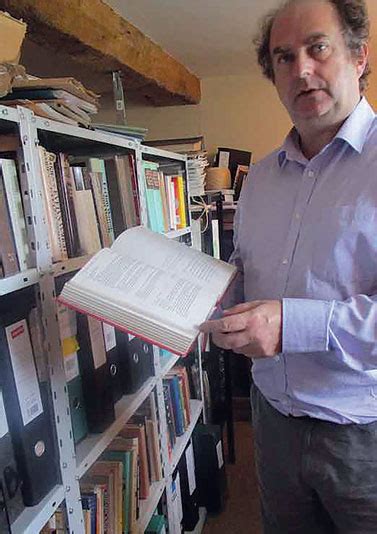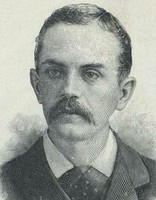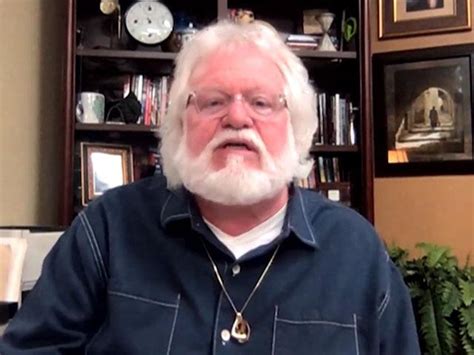Top 113 Omniscient Quotes & Sayings - Page 2
Explore popular Omniscient quotes.
Last updated on April 20, 2025.
And first, it seems not at all probable, That if the Omniscient Author of Nature knew that the study of his Works did really tend to make Men disbelieve his Being or Attributes, he would have given Men so many Invitations, and almost Necessities, to study and contemplate the Nature of his Creatures: Of these Invitations divers have been mention'd already, and more might be added to them, if we thought it requisite.
It is safe to say that almost every person living in New Orleans at the moment Hurricane Katrina struck shared your belief in an omnipotent, omniscient, and compassionate God. But what was God doing while Katrina laid waste to their city? Surely He heard the prayers of those elderly men and women who fled the rising waters for the safety of their attics, only to be slowly drowned there.
Do not praise your own faith exclusively so that you disbelieve all the rest. If you do this you will miss much good. Nay, you will miss the whole truth of the matter. God, the Omniscient and the Omnipresent, cannot be confined to any one creed, for He says in the Quran, wheresoever ye turn, there is the face of Allah. Everybody praises what he knows. His God is his own creature, and in praising it, he praises himself. Which he would not do if he were just, for his dislike is based on ignorance.
And from true lordship it follows that the true God is living, intelligent, and powerful; from the other perfections, that he is supreme, or supremely perfect. He is eternal and infinite, omnipotent and omniscient; that is, he endures from eternity to eternity; and he is present from infinity to infinity; he rules all things, and he knows all things that happen or can happen.
The Lord has said, ‘I have chosen thee in the furnace of affliction.’ (Isaiah 48:10, 1 Nephi 20:10). He knows, being omniscient, how we will cope with affliction beforehand. But we do not know this. We need, therefore, the refining that God gives to us, though we do not seek or crave such tribulation.
About 120 million of us place the big bang 2,500 years after the Babylonians and Sumerians learned to brew beer. If our polls are to be trusted, nearly 230 million Americans believe that a book showing neither unity of style nor internal consistency was authored by an omniscient, omnipotent and omnipresent deity.
I go to assume a task more difficult than that which devolved upon Washington. Unless the great God, who assisted him, shall be with me and aid me, I must fail; but if the same omniscient mind and almighty arm that directed and protected him shall guide and support me, I shall not fail - I shall succeed.
One of the reasons people might be fallible, why we might fail to do what we try to do isignorance, that we have a limited understanding of the laws of the world - the physical laws that govern the world and of all the particulars of the world upon which those laws work. And then there's ineptitude, meaning that the knowledge is available, but individuals fail to apply it correctly. The third source is "necessary fallibility." That is, we're never going to be omniscient, there is some knowledge that we will simply never achieve, and there are limits to what we will be able to do.
I have discovered that many of the things I thought were priceless are as cheap as costume jewelry, and much of what I labeled worthless was, all the time, filled with the kind of beauty that directly nourishes my soul... Now I think that the vast majority of us "normal" people spend our lives trashing our treasures and treasuring our trash. We bustle around trying to create the impression that we are hip, imperturbable, omniscient, in perfect control, when in fact we are awkward and scared and bewildered.
Live and act within the limit of your knowledge and keep expanding it to the limit of your life. Redeem your mind from the hockshops of authority. Accept the fact that you are not omniscient, but playing a zombie will not give you omniscience-that your mind is fallible, but becoming mindless will not make you infallible-that an error made on your own is safer than ten truths accepted on faith, because the first leaves you the means to correct it, but the second destroys your capacity to distinguish truth from error.
Church is missing transcendence. My generation was raised on a religion of moral control. Do this. Don't do that. And a lot of self-help religion. Feel better. Get out of debt. Six ways to overcome your fears. Seven ways not to lust. Ultimately that message didn't work. It was empty. There was no transcendence. The omniscient, omnipresent, all-powerful God of the universe wasn't the focus.
If you read novels of the 19th century, they're pretty experimental. They take lots of chances; they seem to break a lot of rules. You've got omniscient narrators lecturing at times to the reader in first person. If you go back to the earliest novels, this is happening to a wild extent, like 'Tristram Shandy' or 'Don Quixote'.
If, as you believe there is an Almighty, Omnipresent, Omniscient God, who created the earth or universe, please let me know, first of all, as to why he created this world. This world which is full of woe and grief, and countless miseries, where not even one person lives in peace....Where is God? What is He doing? Is He getting a diseased pleasure out of it? A Nero! A Genghis Khan! Down with Him!
It's not arrogant to say that you can't figure out the answers to the universe with your internal faith. It's not arrogant to know that there's no omniscient, omnipotent prime mover in the universe who loves you personally. It's not sad to feel that life and the love of your real friends and family is more than enough to make life worth living. Isn't it much sadder to feel that there is a more important love required than the love of the people who have chosen to spend their limited time with you?
Our submission to general principles is necessary because we cannot be guided in our practical action by full knowledge and evaluation of the consequences. So long as men are not omniscient, the only way in which freedom can be given to the individual is by such general rules to delimit the sphere in which the decision is his. There can be no freedom if the government is not limited to particular kinds of action but can use its powers in any ways which serve particular ends.
In affirming God to be supreme in all things, the classical theist describes him in a number of ways. He is perfect, loving, good, infinite, omnipotent, omniscient, eternal, timeless, transcendent, personal, immutable and immanent. But how can this be? Is it really possible to be both eternal and timeless? Immutable and immanent? Personal and at the same time transcendent?
In every man and in every animal, however weak or wicked, great or small, resides the same omnipresent, omniscient soul. The difference is not in the soul, but in the manifestation. Between me and the smallest animal, the difference is only in manifestation, but as a principle he is the same as I am, he is my brother, he has the same soul as I have. This is the greatest principle that India has preached.
In that process of coming to know that which we name as divine, the God who is love is slowly transformed into the love that is God. Let me repeat that...We breathe love in, and we breathe love out. It is omnipresent, omniscient, omnipotent. It is never exhausted, always expanding. When I try to describe this reality, words fail me; so I simply utter the name God. That name, however, is no longer for me the name of a being.
Except during my childhood, when I was probably influenced by Michelangelo's Sistine Chapel depiction of God with a flowing white beard, I have never tried to project the Creator in any kind of human likeness. The vociferous debates about whether God is male or female seem ridiculous to me. I think of God as an omnipotent and omniscient presence, a spirit that permeates the universe, the essence of truth, nature, being, and life. To me, these are profound and indescribable concepts that seem to be trivialized when expressed in words.
If God is omnipotent and omniscient, why didn't he start the universe out in the first place so it would come out the way he wants? Why's he constantly repairing and complaining? No, there's one thing the Bible makes clear: The biblical God is a sloppy manufacturer. He's not good at design, he's not good at execution. He'd be out of business, if there was any competition.
Keats mourned that the rainbow, which as a boy had been for him a magic thing, had lost its glory because the physicists had found it resulted merely from the refraction of the sunlight by the raindrops. Yet knowledge of its causation could not spoil the rainbow for me. I am sure that it is not given to man to be omniscient. There will always be something left to know, something to excite the imagination of the poet and those attuned to the great world in which they live (p. 64)
Go back to bed', said the omniscient interior voice, because you don't need to know the final answer right now, at three o'clock in the morning on the Thursday in November. 'Go back to bed', because I love you. 'Go back to bed', beacause the only thing you need to do for now is get some rest and take good care of yourself until you do know the answer.
Early on, I settled on the first-person strategy as a way to deal with exposition and world-description issues. As long as the book is, it could have been far longer had I gone with an omniscient third-person narrator, or multiple point-of-view characters, since either of those would have enabled me to impart much more detailed information about the history and geography of the world.
Apparently on the screen I look tall, ageless, and damned close to omniscient-delivering jeopardy-laden warnings through gritted teeth. But when people see me on the street, they say 'by God, this kid is 5 foot 5, he's got a broken nose, and looks about as foreboding as a bank teller on a lunch break.'
We are compelled by the theory of God's already achieved perfection to make Him a devil as well as a god, because of the existenceof evil. The god of love, if omnipotent and omniscient, must be the god of cancer and epilepsy as well.... Whoever admits that anything living is evil must either believe that God is malignantly capable of creating evil, or else believe that God has made many mistakes in His attempts to make a perfect being.
A whole lot of us go through life assuming that we are basically right, basically all the time, about basically everything: about our political and intellectual convictions, our religious and moral beliefs, our assessments of other people, our memories, our grasp of facts. As absurd as it sounds when we stop to think about it, our steady state seems to be one of unconsciously assuming that we are very close to omniscient.
I believe God himself will someday debate with and answer every objection arrogant men can come up with against him; I believe he will humble us and humor himself. Know-it-alls, pseudo-intellectuals, militant anti-theists, for Christ's sake, or rather their own sake, best beware of getting roasted by their own medicine. Ah! Our delusions of trying to argue against an omniscient Creator.
But why doesn't the Gospel ever say that Christ laughed?" I asked, for no good reason. "Is Jorge right?" "Legions of scholars have wondered whether Christ laughed. The question doesn't interest me much. I believe he never laughed, because, omniscient as the son of God had to be, he knew how we Christians would behave. . . .
Believing there is no God means the suffering I've seen in my family and indeed all the suffering in the world isn't caused by any omniscient, omnipresent, omnipotent force that isn't bothered to help or is just testing us, but rather something we all may be able to help others with in the future. No God means the possibility of less suffering in the future.
To deprecate human reason by saying that none of us is or can be omniscient is absurd, for it takes an impossible standard as the judge of a possible and real condition. All of our knowledge we get from the exercise of our reason; to say that no man can be God and know everything is to take an irrational standard of evaluation.
A letter is not a dialogue or even an omniscient exposition. It is a fabric of surfaces, a mask, a form as well suited to affectations as to the affections. The letter is, by its natural shape, self-justifying; it is one's own evidence, deposition, a self-serving testimony. In a letter the writer holds all the cards, controls everything about himself and about those assertions he wishes to make concerning events or the worth of others. For completely self-centered characters, the letter form is a complex and rewarding activity.
Do you remember when you were 10 or 11 years old and you really thought your folks were the best? They were completely omniscient and you took their word for everything. And then you got older and you went through this hideous age when suddenly they were the devil, they were bullies, and they didn't know anything.
Nothing has afforded me so convincing a proof of the unity of the Deity as these purely mental conceptions of numerical and mathematical science which have been by slow degrees vouchsafed to man, and are still granted in these latter times by the Differential Calculus, now superseded by the Higher Algebra, all of which must have existed in that sublimely omniscient Mind from eternity.
That's why the army sends all its future generals to what we call "charm school." As soon as you are a general, people think that you know everything. You think yourself that you have become omniscient and omnipotent. Be careful, because people want to do everything they can to please the general, and you need to guard against this.
I was writing a story, 'The Artistic Career of Corky,' about two young men, Bertie Wooster and his friend Corky, getting into a lot of trouble, and neither of them had brains enough to get out of the trouble. I thought: Well, how can I get them out? And I thought: Suppose one of them had an omniscient valet?
Praise causes the presence of the Lord to come into our midst. Even though God is omniscient, He manifests His authority and rule in our environment when we praise Him. When we praise, God comes in and leads us forth... He does not just visit us, but He abides and aligns Himself with us to walk with us into the path that He has chosen for us.
If someone tells you that George Bush is not the 43rd president of the United States, they might be engaged in wishful thinking, or denial, but if they make that claim, it's either true or false! And you can assess that, regardless of whether there's an omniscient narrator, or an unreliable narrator, or it's shot in vérité, or it's manipulated, it's agitprop, whatever! It makes no difference! It's a style!















































